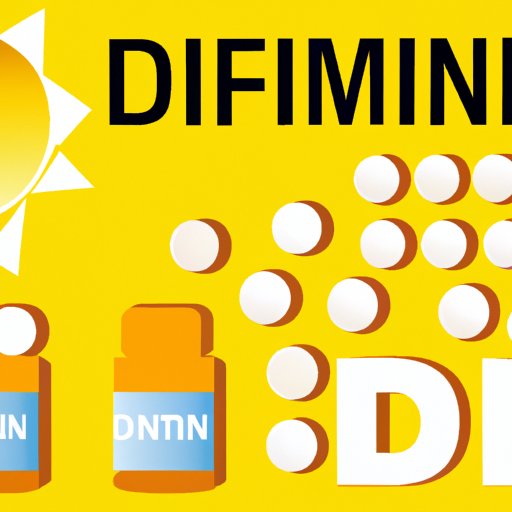Introduction
Vitamin D is an essential nutrient that helps regulate calcium levels in the body and promotes bone health. But vitamin D is more than just a bone booster. It’s also important for the immune system, mental health, and more. In this article, we’re going to explore everything you need to know about vitamin D, including its benefits, deficiencies, absorption process, and its influence on your mood.
The Benefits of Vitamin D: Exploring the Role of the “Sunshine Vitamin”
Vitamin D is known as the “sunshine vitamin” because it’s produced in the skin when exposed to sunlight. But why is vitamin D so important? In addition to regulating calcium and bone health, vitamin D also plays a role in reducing inflammation, supporting immune function, and maintaining cardiovascular health.
From Bone Health to Immunity: Understanding the Importance of Vitamin D
Vitamin D is essential for bone health, and a deficiency can lead to weak bones and a higher risk of fractures and bone loss. But vitamin D is also important for the immune system. It helps to activate immune cells and prevent autoimmune diseases. Research has also suggested that vitamin D may be linked to reducing the risk of certain diseases, like cancer and heart disease.
The Surprising Truth About Vitamin D Deficiency: Symptoms, Causes, and Remedies
It’s estimated that more than one billion people worldwide have a vitamin D deficiency. Symptoms of a deficiency include fatigue, muscle weakness, joint pain, and depression. But what causes a vitamin D deficiency? Lack of sunlight exposure is the most common cause, but dietary factors like a low intake of vitamin D-rich foods can also lead to a deficiency. Remedies for a deficiency include increasing sun exposure, eating more vitamin-D rich foods, and taking supplements.
Unlocking the Science behind Vitamin D: How Our Body Produces and Absorbs It
Our body produces vitamin D when our skin is exposed to sunlight. But what happens when we don’t get enough sunlight? We can also absorb vitamin D from food sources like fatty fish and fortified cereals, or from supplements. The amount of vitamin D we need varies depending on factors like our age, lifestyle, and where we live.
Vitamin D and Your Mental Health: Can a “Sunshine Vitamin” Improve Your Mood?
Research has suggested that low vitamin D levels may be linked to an increased risk of depression and other mental health conditions. Vitamin D may play a role in regulating mood and preventing depression. Studies have found that supplementing with vitamin D may improve symptoms of depression, particularly in those with a deficiency.
Debunking Vitamin D Myths: Examining Common Misconceptions About This Essential Nutrient
There are many myths surrounding vitamin D, like the idea that you can get enough vitamin D from food alone, or that the sun is always a reliable source of vitamin D. While some foods may contain vitamin D, it can be difficult to get enough through diet alone. And while sunlight is a great source of vitamin D, factors like location, season, and sunscreen use can impact how much vitamin D our skin produces. It’s important to get our vitamin D levels checked regularly and to take supplements as needed.
Conclusion
Vitamin D is an essential nutrient that is important for many aspects of our health, from bone health to mental health. A vitamin D deficiency is a common problem that can lead to a range of symptoms and health issues. To maintain healthy vitamin D levels, it’s important to get enough sun exposure, eat vitamin D-rich foods, and take supplements if necessary. Talk to your healthcare provider to see if you should consider vitamin D supplementation.
